Lallemand – WILDBREW Philly Sour
฿180.00
In stock
WILDBREW PHILLY SOUR
Lallemand ร่วมมือกับมหาวิทยาลัยใน Philadelphia, USA คัดเลือกสายพันธุ์ของ Lanchancea เพื่อนำมาใช้หมักเบียร์เปรี้ยว (Sour Beer) ซึ่งให้ Lactic acid ในปริมาณพอเหมาะ เหมาะสำหรับทำเบียร์ที่มีรสเปรี้ยวกลางๆ ให้ความสดชื่นเมื่อดื่ม
Philly Sour produces moderate amounts of lactic acid in addition to ethanol in one simple fermentation step.
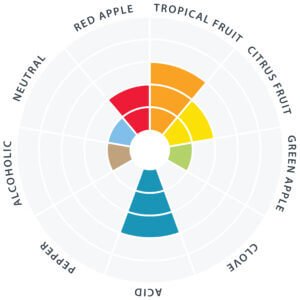
Microbiological Properties:
Typical Analysis of Philly Sour Yeast:
- Percent solids 93% – 96%
- Viability ≥ 1 x 109 CFU per gram of dry yeast
- Wild Yeast Wild Yeast WildBrew™ Philly Sour will grow on wild yeast media including Lysine, LCSM and LWYM
- STA1 gene Pure strain is STA1 negative
- Contamination is undetectable by PCR test
- Bacteria <1 per 1 x 106 yeast cells
- Finished product is released to the market only after passing a rigorous series of tests
*See specifications sheet for details
Brewing Properties:
- Fermentation that can be completed in 10 days.
- High attenuation and High flocculation.
- Aroma and flavor is sour, red apple and stone fruit, notably peach.
- The optimal temperature range for WildBrew™ Philly Sour yeast when producing
- traditional styles is 20°C(68°F) to 25°C(77°F).
- In the Lallemand standard conditions wort, typical pH of 3.2-3.5 and titratable acidity of
- 0.1-0.4% lactic acid are achieved. Higher lactic acid levels will be achieved in worts that are higher in glucose.
Lag phase, total fermentation time, attenuation and flavor are dependent on pitch rate, yeast handling, fermentation temperature and nutritional quality of the wort.
If you have questions please do not hesitate to contact us at brewing@lallemand.com.
Fermentation Tips:
1. LACTIC ACID MANAGEMENT
The level of lactic acid obtained is controlled by the amount of glucose in the wort.
• Glucose levels can be controlled by:
- Mash temperature (where a higher mash temperature creates less lactic acid, a lower mash temperature creates more).
- Use of glucose-based adjuncts (ex. dextrose).
- Grain bill where the use of more specialty malts creates less lactic acid and the use of more highly modified malts creates more.
2. SECONDARY YEAST
• If a secondary yeast will be used, it should be added midway through fermentation to avoid competition for simple sugars.
3. FRUIT
The timing of fruit additions will affect the amount of lactic acid produced.
- Fruit added in the first 24-48hrs of fermentation will increase lactic acid production due to the presence of more glucose.
- Fruit added midway through fermentation (2-4 days) will increase attenuation without significantly increasing lactic acid production.
- Fruit added after active fermentation has finished may result in incomplete fermentation. WildBrew Philly Sour™ is highly flocculant and may not efficiently metabolize late sugar additions.
4. REPITCHING AND BOTTLE CONDITIONING
*Repitching is not recommended due to inconsistent results.
Lactic acid levels may be lower or absent in re-pitched fermentations.
However, WildBrew Philly Sour™ performs well when propagated by combining multiple brews into one fermenter.
*Bottle Conditioning with WildBrew Philly Sour™ is not recommended since the priming sugar will be converted into both lactic acid and ethanol, so levels of lactic acid, ethanol and CO2 in the beer may be inconsistent. For best results, use a separate strain such as LalBrew CBC-1 to bottle condition WildBrew Philly Sour™ fermentations.
Fermentation Kinetics
• Lactic acid is being created from glucose within the first 24-72 hours of fermentation
- Apparent wort density does not significantly drop during the lactic production phase.
- Very little CO2 production occurs during this stage.
- Ethanol production will typically begin 24 hours after pitching.
• Wildbrew Philly Sour™ benefits from high fermentation temperatures (22 – 300C)
- A higher fermentation temperature is recommended if a lower pitch rate is used.
- Similarly, if fermenting at a low temperature, a higher pitch rate (100-150g/hl) is recommended
• Ethanol production picks up once the yeast starts to metabolize maltose.
- Typical attenuation levels are: 70-85%, with a pH range of 3.2-3.5, and Titratable acidity (lactic acid) of: 3-8g/l
More information about Lallemand WildBrew Philly Sour
Like a sour beer? Try using Quest Labs: QL-LT16 Lactobacillus brevis
| Weight | 12 g |
|---|
Brand
Be the first to review “Lallemand – WILDBREW Philly Sour” Cancel reply
You must be logged in to post a review.

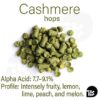

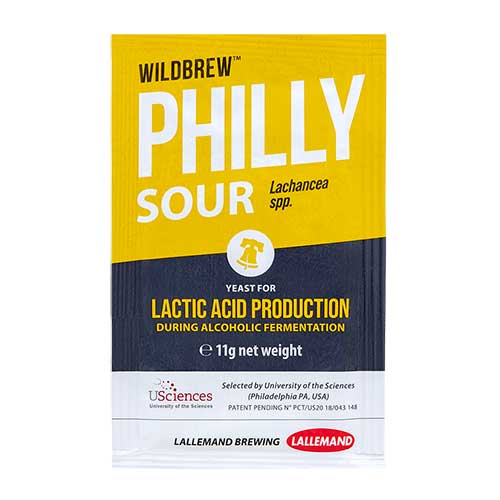



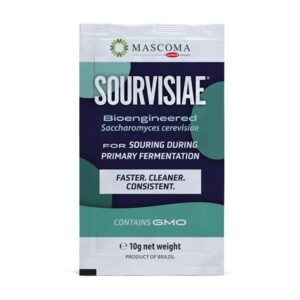
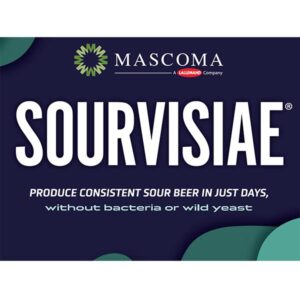






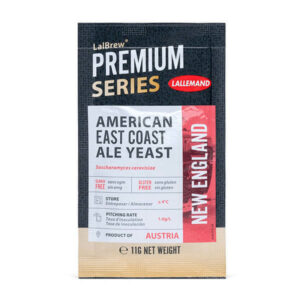
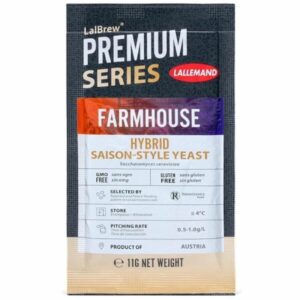
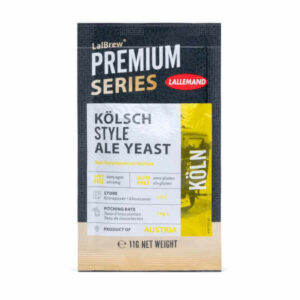
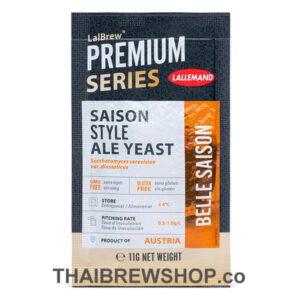


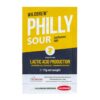
Reviews
There are no reviews yet.